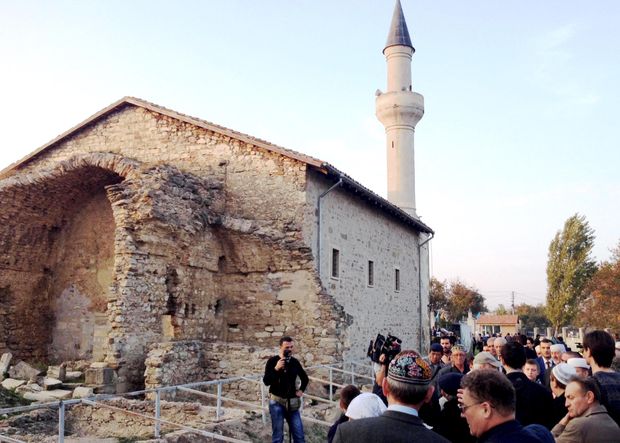Crimean Muftiate aloof from its mainland followers
The annexed peninsula celebrates 700th anniversary of Uzbeg Khan Mosque without representatives of Ukraine
An international theoretical and practical conference headlined “Relevant problems of studying and preservation of Crimea’s Islamic heritage,” dedicated to the 700th anniversary of the Uzbeg Khan Mosque in Stary Krym, took place in Simferopol. Photo exhibition “Crimean Mosques” was held within the framework of the conference, its participants visited the Uzbeg Khan Mosque complex and Madrasa of Indji-bek Khatun in Stary Krym, and went on a tour to Bakhchysarai.
The conference brought together leading world experts on Crimean history of the Golden Horde period and Muslim spiritual leaders from the Russian Federation and Europe. Unfortunately, even though the celebratory events dedicated to the mosque’s 700th anniversary were planned and organized by Ukraine before the annexation of Crimea, neither representatives of Ukrainian government, nor those of the Committee for Religious Affairs, nor the Spiritual Administration of Muslims of Ukraine (SAMU) could participate in the conference because of relations with Russia and the regime in occupied Crimea.
The fact that along with the Spiritual Administration of Muslims of Crimea and Turkey, the so-called “Council of Ministers of Crimea” was among the organizers of the conference shows the intention to separate the Muslims of Crimea from the rest of Ukrainian Muslims. A significant role was also played by the fact that the SAM of Crimea actively cooperates with anti-Ukrainian spiritual administrations of Muslims of Tatarstan, the Russian Council of Muftis, and that it virtually broke off relations with the SAMU, even though the history of religious relations between the Crimean Khanate and various forms of the Ukrainian state dates back to the 14th century.
After Russia’s annexation of Crimea, a significant part of Muslims left the peninsula and moved to the continental part of Ukraine, primarily Lviv and other oblasts, where they are creating their religious organizations now, and where numerous communities of Crimean Tatars exist. Moreover, a significant part of Muslims lives in Kherson oblast, not only those who left Crimea after its annexation, and they require patronage from the Spiritual Administration of Muslims of Crimea. Therefore, we can talk about the presence of a significant Muslim ummah on the territory of Ukraine, which ended up abandoned by the Crimean Muftiate and religious organizations of its homeland as a result of the annexation of Crimea.
Now, after the annexation of Crimea, it was Ukraine that provided refuge to members of the legitimately elected Milli Mejlis of Crimean Tatars, which was in the closest relations possible with the SAM of Crimea and which effectively transferred its activities to Ukraine because of the obstacles for activity in Crimea and virtual confiscation of its headquarters. And the fact that the SAM of Crimea turned away from Ukraine is short-sighted policy of the Crimean Muftiate, which thereby betrayed thousands of its believers.
The participants of the International conference dedicated to the 700th anniversary of the Uzbeg Khan Mosque adopted a resolution, in which they urged the “state bodies” of Crimea to ensure complete conservation of the mosque and madrasa in Stary Krym, and also develop and ensure the implementation of programs on complex conservation and restoration of Crimean Tatars’ historic and cultural monuments.
At the same time, as the conference results show, Crimean Muftiate representatives and Crimean scholars have virtually accepted the fact that the majority of valuable items from the Uzbeg Khan Mosque and madrasa in Stary Krym, as well as from archaeological monuments of global importance including antique Bosporus in Kerch, Chersonesus in Sevastopol, monuments of Scythian period in Crimea and Naples-Scythian period in Simferopol, and many other Crimean rarities and globally renowned centers have been removed to the Hermitage and various Moscow museums, and are displayed far away from the places of their origin, attracting tourists to Russian museums, while tourists in Crimea have to visit the neglected ruins of these world-famous monuments.
And the fact that the overwhelming majority of the participants were from Russia, and that the conference dissociated itself from Ukrainian scholars and religious figures, added to the fact that the conference virtually accepted the plunder of Crimea’s cultural heritage by Russia. The Spiritual Administration of Muslims of Ukraine, the Milli Mejlis of the Crimean Tatars, and Crimean Tatar communities in Ukraine should follow UNESCO practices and correct this mistake of the SAM of Crimea, the occupational “Ministry of Culture of Crimea,” “Committee for Conservation of Cultural Heritage” of Crimea, and demand that Russia return stolen valuables to the place of their origin, i.e. to Crimea.
Newspaper output №:
№66, (2014)Section
Topic of the Day





